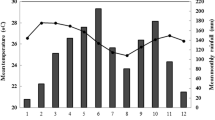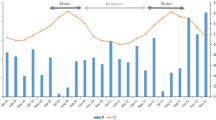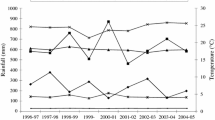Abstract
In a two-season study, six treatments comprising three organic resources (ORs) [Centrosema pubsecens (CENT), Crotalaria juncea (CROT), and Zea mays (MZE)], two conventional chemical fertilizer (CF) applications plus control were tested at Nyankpala (Guinea savannah) and Kade (Deciduous forest) to identify suitable conditions to optimize their effects on maize yield and soil chemical and microbial biomass. Aboveground biomasses of each OR were applied to respective plots at 4 Mg ha−1 season−1, followed by basal NPK 15:15:15 and subsequent topdressing with [(NH4)2SO4] at 40 kg ha−1 and 30 kg N ha−1, respectively. Maize yield response was significant in Nyankpala compared to Kade. Average maize grain yield increased from 1.2 to 1.7 t ha−1 at Nyankpala versus 1.1 to 1.4 t ha−1 at Kade. Additionally, MZE plus CF consistently showed high average grain yield at both sites. On average, agronomic N use efficiency (AEN) increased from 4.9 to 18.3 kg grain kg−1 N applied at Nyankpala against a reduction from 13.0 to 12.3 kg grain kg−1 N applied at Kade. Moreover, AEN increased with year of cultivation in the sole CF and MZE plus CF treatments. However, CROT plus CF treatment enhanced microbial biomass compared to sole CFs at both sites. Overall, while the effects of MZE with CF application on maize yield appeared suitable at both sites, inconsistent responses were observed in CENT and CROT amendments. We conclude that soil fertility and climate are essential variables in regulating the effects of OR and CF inputs on yield and AEN in maize production systems.



Similar content being viewed by others
References
Abbasi K, Tahir M, Sabir N, Khurshid M (2015) Impact of the addition of different plant residues on nitrogen mineralization-immobilization turnover and carbon content of a soil incubated under laboratory conditions. Solid Earth 6:197–205. https://doi.org/10.5194/se-6-197-2015
Abera G, Wolde-meskel E, Bakken LR (2012) Carbon and nitrogen mineralization dynamics in different soils of the tropics amended with legume residues and contrasting soil moisture contents. Biol Fertil Soils 48:51–66. https://doi.org/10.1007/s00374-011-0607-8
Adjei-Gyapong T, Asiamah R (2002) The interim Ghana soil classification system and its relation with the World Reference Base for Soil Resources. FAO Rep Soil Resour 98:9–13
Agegnehu G, Bass AM, Nelson PN, Bird MI (2016) Benefits of biochar, compost and biochar-compost for soil quality, maize yield and greenhouse gas emissions in a tropical agricultural soil. Sci Total Environ 543(Part A):295–306
Andreasen C, Litz AS, Streibig JC (2006) Growth response of six weed species and spring barley (Hordeum vulgare) to increasing levels of nitrogen and phosphorus. Weed Res 46:503–512. https://doi.org/10.1111/j.1365-3180.2006.00519.x
Asante M, Becker M, Angulo C, Fosu M, Dogbe W (2017) Seasonal nitrogen dynamics in lowland rice cropping systems in inland valleys of northern Ghana. J Plant Nutr Soil Sci 180:87–95. https://doi.org/10.1002/jpln.201600209
Bais HP, Weir TL, Perry LG, Gilroy S, Vivanco JM (2006) The role of root exudates in rhizosphere interactions with plants and other organisms. Annu Rev Plant Biol 57:233–266
Bakht J, Shafi M, Jan MT, Shah Z (2009) Influence of crop residue management, cropping system and N fertilizer on soil N and C dynamics and sustainable wheat (Triticum aestivum L.) production. Soil Tillage Res 104:233–240. https://doi.org/10.1016/j.still.2009.02.006
Barry B, Obuobie E, Andreini M, Andah W, Pluquet M (2005) Comprehensive assessment of water management in agriculture: comparative study of river basin development and management. International Water Management Institute. http://www.iwmi.cgiar.org/assessment/files_new/research_projects/river_basin_development_and_management/VoltaRiverBasin_Boubacar.pdf. Accessed 11 Nov 2018
Bationo A, Kihara J, Vanlauwe B, Waswa B, Kimetu J (2007) Soil organic carbon dynamics, functions and management in West African agro-ecosystems. Agric Syst 94:13–25. https://doi.org/10.1016/j.agsy.2005.08.011
Bationo A, Tabo R, Waswa B, Okoye J, Kihara J, Fosu M et al (2008) Synthesis of soil, water and nutrient management research in the Volta Basin. Ecomedia, Nairobi
Bauer A, Black AL (1992) Organic Carbon effects on available water capacity of three soil textural groups. Soil Sci Soc Am J 56:248–254. https://doi.org/10.2136/sssaj1992.03615995005600010038x
Brady CN, Weil RR (1999) The Nature and properties of soil, 12th edn. Prentice Hall Inc, Upper saddle river
Brookes PC, Landman A, Pruden G, Jenkinson DS (1985) Chloroform fumigation and the release of soil nitrogen: a rapid direct extraction method to measure microbial biomass nitrogen in soil. Soil Biol Biochem 17(6):837–842. https://doi.org/10.1016/0038-0717(85)90144-0
Chivenge P, Vanlauwe B, Gentile R, Wangechi H, Mugendi D, van Kesel C et al (2009) Organic and mineral input management to enhance crop productivity in central Kenya. Agron J 101:1266–1275. https://doi.org/10.2134/agronj2008.0188x
Chivenge P, Vanlauwe B, Six J (2011) Does the combined application of organic and mineral nutrient sources influence maize productivity? A meta-analysis. Plant Soil 342:1–30. https://doi.org/10.1007/s11104-010-0626-5
Constantinides M, Fownes JH (1994) Nitrogen mineralization from leaves and litter of tropical plants: relationship to nitrogen, lignin and soluble polyphenol concentrations. Soil Biol Biochem 26:49–55. https://doi.org/10.1016/0038-0717(94)90194-5
Fanin N, Hättenschwiler S, Schimann H, Fromin N (2014) Interactive effects of C, N and P fertilization on soil microbial community structure and function in an Amazonian rain forest. Funct Ecol 29:140–150. https://doi.org/10.1111/1365-2435.12329
Foley JA (2011) Can we feed the world and sustain the planet? Sci Am 305:60–65
Galal TM, Shehata HS (2015) Impact of nutrients and heavy metals capture by paddy weeds on the growth and production of rice crop (Oryza sativa L.) irrigated with different water sources. Ecol Indic 54:108–115
Gentile R, Vanlauwe B, van Kessel C, Six J (2009) Managing N availability and losses by combining fertilizer-N with different quality residues in Kenya. Agric Ecosyst Environ 131:308–314. https://doi.org/10.1016/j.agee.2009.02.003
Gomez KA, Gomez AA (1984) Statistical procedures for agricultural research. Wiley, New York
Gong W, Yan X, Wang J, Hu T, Gon Y (2009) Long-term manuring and fertilization effects on soil organic carbon pools under a wheat-maize cropping system in North China Plain. Plant Soil 314:67–76. https://doi.org/10.1007/s11104-008-9705-2
Handayanto E, Giller KE, Cadisch G (1997) Regulating N release from legume tree prunings by mixing residues of different quality. Soil Biol Biochem 29:1417–1426. https://doi.org/10.1016/S0038-0717(97)00047-3
Hobbie SE (1998) Chloroform fumigation direct extraction (CFDE) protocol for microbial biomass carbon and nitrogen. https://web.stanford.edu/group/Vitousek/chlorofume.html. Accessed 10 Sept 2018
Joergensen RG (1996) The fumigation–extraction method to estimate soil microbial biomass: calibration of the KEC factor. Soil Biol Biochem 28:25–31
Kamaa M, Mburu H, Blanchart E, Chibole L, Chotte J, Kibunja C et al (2011) Effects of organic and inorganic fertilization on soil bacterial and fungal microbial diversity in the Kabete long-term trial, Kenya. Biol Fertil Soils 47:315–321. https://doi.org/10.1007/s00374-011-0539-3
Kimetu JM, Lehmann J, Kinyangi JM, Cheng CH, Thies J, Mugendi DN et al (2009) Soil organic C stabilization and thresholds in C saturation. Soil Biol Biochem 41:2100–2104. https://doi.org/10.1016/j.soilbio.2009.07.022
Li LJ, Han XZ, You MY, Yuan YR, Ding XL et al (2013) Carbon and nitrogen mineralization patterns of two contrasting crop residues in a Mollisol: effects of residue type and placement in soils. Eur J Soil Biol 54:1–6. https://doi.org/10.1016/j.ejsobi.2012.11.002
Mochizuki A, Homma K, Horie T, Shiraiwa T, Wakatsu E, Supapoj N et al (2006) Increased productivity of rainfed lowland rice by incorporation of pond sediments in Northeast Thailand. Field Crop Res 96:422–427. https://doi.org/10.1016/j.fcr.2005.08.007
Ncube B, Twomlow SJ, Dimes JP, van Wijk MT, Giller KE (2009) Resource flows, crops and soil fertility management in smallholder farming systems in semi-arid Zimbabwe. Soil Use Manag 25:78–90. https://doi.org/10.1111/j.1475-2743.2009.00193.x
Nelson DW, Sommers LE (1996) Total carbon, organic carbon and organic matter. In: Sparks DL, Page AL, Helmke PA, Loeppert RH (eds) Methods of soil analyses, Part 3, chemical methods. Soil Science Society of America, Madison, pp 961–1010
Omari RA, Aung HP, Hou M, Yokayama T, Onwona-Agyeman S, Oikawa Y et al (2016) Influence of different plant materials in combination with chicken manure on soil carbon and nitrogen contents and vegetable yield. Pedosphere 26:510–521. https://doi.org/10.1016/S1002-0160(15)60061-3
Omari RA, Bellingrath-Kimura SD, Sarkodee-Addo E, Oikawa Y, Fujii Y (2018) Exploring farmers’ indigenous knowledge of soil quality and fertility management practices in selected farming communities of the guinea savannah agro-ecological zone of Ghana. Sustainability 10:1034. https://doi.org/10.3390/su10041034
Palm CA, Rowland AP (1997) Chemical characterization of plant quality for decomposition. In: Cadisch G, Giller KE (eds) Driven by nature: plant litter quality and decomposition. CAB International, Wallingford, pp 379–392
Palm CA, Gachengo CN, Delve RJ, Cadisch G, Giller KE (2001) Organic inputs for soil fertility management in tropical agro ecosystems: application of an organic resource database. Agric Ecosyst Environ 83:27–42
Parsons TR, Maita Y, Lalli CM (1984) A manual of chemical and biological methods for seawater analysis, 1st edn. Pergamon Press, Oxford, p 173
Partey ST, Preziosi RF, Robson GD (2013) Maize residue interaction with high quality organic materials: effects on decomposition and nutrient release dynamics. Agric Res 2:58–67. https://doi.org/10.1007/s40003-013-0051-0
Partey ST, Preziosi RF, Robson GD (2014) Improving maize residue use in soil fertility restoration by mixing with residues of low C-to-N ratio: effects on C and N mineralization and soil microbial biomass. J Soil Sci Plant Nutr 14:518–531
Powlson DS, Prookes PC (1987) Measurement of soil microbial biomass provides an early indication of changes in total soil organic matter due to straw incorporation. Soil Biol Biochem 19:159–164
Rasche F, Cadisch G (2013) The molecular microbial perspective of organic matter turnover and nutrient cycling in tropical agroecosystems—what do we know? Biol Fertil Soils 49:251–262. https://doi.org/10.1007/s00374-013-0775-9
Ros GH, Hoffland E, van Kessel C, Temminghoff EJM (2009) Extractable and dissolved soil organic nitrogen—a quantitative assessment. Soil Biol Biochem 41:1029–1039
Rudrappa L, Purakayastha TJ, Singh D, Bhadraray S (2006) Long-term manuring and fertilization effects on soil organic carbon pools in a Typic Haplustept of semi-arid sub-tropical India. Soil Tillage Res 88:180–192. https://doi.org/10.1016/j.still.2005.05.008
Sanchez PA (2002) Soil fertility and hunger in Africa. Science 295:2019–2020. https://doi.org/10.1126/science.1065256
Thomsen IK, Petersen BM, Bruun S, Jensen LS, Christensen BT (2008) Estimating soil C loss potentials from the C to N ratio. Soil Biol Biochem 40:849–852. https://doi.org/10.1016/j.soilbio.2007.10.002
Tsujimoto Y, Inusah B, Katsura K, Fuseini A, Dogbe W, Zakaria AI et al (2017) The effect of sulfur fertilization on rice yields and nitrogen use efficiency in a floodplain ecosystem of northern Ghana. Field Crop Res 211:155–164. https://doi.org/10.1016/j.fcr.2017.06.030
Tu C, Ristaino JB, Hu S (2006) Soil microbial biomass and activity in organic tomato farming systems: effects of organic inputs and straw mulching. Soil Biol Biochem 38:247–255. https://doi.org/10.1016/j.soilbio.2005.05.002
US Environmental Protection Agency (1983) Methods for chemical analysis of water and wastes. Environmental Protection Agency, Washington, DC, p 491
Vanlauwe B, Gachengo C, Shepherd K, Barrios E, Cadisch G, Palm CA (2005) Laboratory validation of a resource quality-based conceptual framework for organic matter management. Soil Sci Soc Am J 69:1135. https://doi.org/10.2136/sssaj2004.0089
Wu T, Schoenau JJ, Li F, Qian P, Malhi SS, Yuanchun S et al (2004) Influence of cultivation and fertilization on total organic carbon and carbon fractions in soils from the Loess Plateau of China. Soil Tillage Res 77:59–68. https://doi.org/10.1016/j.still.2003.10.002
Yang X, Ren W, Sun B, Zhang S (2012) Effects of contrasting soil management regimes on total and labile soil organic carbon fractions in a loess soil in China. Geoderma 177–178:49–56. https://doi.org/10.1016/j.geoderma.2012.01.033
Acknowledgements
The first author is grateful to the Ministry of Education, Culture, Sports, Science and Technology (MEXT), Japan for providing the PhD study scholarship. We want to thank Agbomadzi Bright of FOHCRE, Kade, Ghana and Edem Halolo of SARI, Tamale, Ghana for their careful management of the experimental fields. Funding was provided by Japan Society for the Promotion of Science (Grant no. 26304024).
Author information
Authors and Affiliations
Corresponding author
Ethics declarations
Conflict of interest
The authors declare no conflict of interest.
Rights and permissions
About this article
Cite this article
Omari, R.A., Fujii, Y., Sarkodee-Addo, E. et al. Organic and chemical fertilizer input management on maize and soil productivity in two agro-ecological zones of Ghana. Environmental Sustainability 1, 437–447 (2018). https://doi.org/10.1007/s42398-018-00040-2
Received:
Revised:
Accepted:
Published:
Issue Date:
DOI: https://doi.org/10.1007/s42398-018-00040-2




